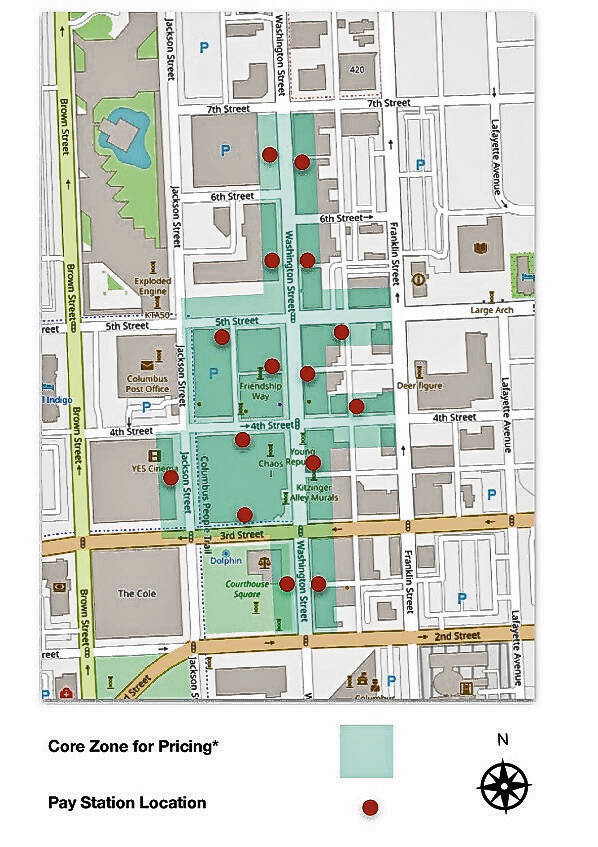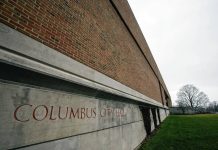
Photo provided This Columbus Parking Commission graphic shows zones for paid parking in downtown Columbus and where automated parking payment stations would be located.
A local parking commission is planning to recommend paid parking for downtown Columbus, with a few tweaks to the suggestions made by consultants.
The Columbus Parking Commission recently discussed Nelson/Nygaard’s recommendations for the city’s downtown parking situation and considered which pieces they might want to adopt, change or hold off on.
For instance, the commission feels that it would be best for paid parking hours to be 8 a.m. to 5 p.m. on weekdays, rather than the 10 a.m. to 8 p.m. timeframe suggested by the firm.
However, the commissioners still have some work to do in terms of consolidating their parking recommendations, which will eventually be passed on to both the Columbus Board of Works and Columbus City Council. City Engineer/Executive Director of Public Works Dave Hayward also mentioned the possibility of holding a public meeting to get feedback from the community.
Hayward is scheduled to give the Columbus Redevelopment Commission a report on Nelson/Nygaard’s updated study on Monday. The redevelopment commission, which provided funds for the contract, will meet at 4 p.m.
Nelson/Nygaard’s update to its 2013 downtown parking study was made up of four tasks: project startup and coordination, stakeholder engagement, updated recommendations, and meter/kiosk procurement guidance.
Many of the firm’s current recommendations are generally similar to those recommended in 2013 — such as pricing on-street parking to improve availability, which would be a major change to downtown Columbus.
Nelson/Nygaard recommended that the city implement priced parking along the “Washington Street Core” of downtown. This includes Washington Street from Second to Seventh; Third Street from Jackson to Washington; Fourth Street from Jackson to Franklin; Fifth Street from Jackson to Franklin; and Jackson Street from Third to Fourth (both sides) and Fourth to Fifth (east side only).
The firm also recommended that paid parking be in effect on weekdays from 10 a.m. to 8 p.m. to maintain availability for restaurants and evening events.
However, parking commission members settled on 8 a.m. to 5 p.m. as a more feasible timeframe.
“The city has some concerns about enforcement personnel being out there in the evening hours when it’s dark,” said Hayward. “Like December after five o’clock would be difficult, and they have to get out in traffic to record license numbers.”
Commission member Kevina Schumaker discussed keeping the 10 a.m. start time as an incentive to go downtown early and a concession to residents. However, chairman and downtown business owner Tom Dell said that employees may take advantage of the time and not move their cars until 10 a.m., or possibly stay put and pay for an hour or two.
“Our encouragement is to get the people that want to come and do commerce downtown an opportunity and availability to come in,” he said. “And if I was a coffee shop owner, I would want that to start early, because that’s when I want people to be able to come downtown and find a place to park.”
In addition to adjusting times, Hayward also mentioned the possibility of adding a couple of areas to the pricing zone recommended by Nelson/Nygaard: Seventh Street from Washington to Franklin, Jackson Street from Second to Third, and Franklin from Third to Fourth. However, commission members indicated that the latter section should probably be a free area to avoid confusion, as the rest of Franklin Street is not included in the pricing zone.
The commission also discussed the need for effective communication with the public about the different parking options that will be available downtown.
“I think there’s going to be a lot of resistance to this,” said commission member and Bartholomew County Public Library Director Jason Hatton. “… There’s already a lot. And so whether it truly does make sense for the city — because I think it does, right? But there’s going to be some pretty big hurdles to get over in terms of public support for it.”
It will be important, he said, to tell residents why they feel the need to implement pay stations and clearly communicate the other options that are available.
In discussing the future, Hayward said that they’ll work on summarizing the parking commission’s recommendations so that these can be ready for its next meeting in August. Once the recommendations are finalized, they will be passed on to the Columbus Board of Works and city council.
“It’ll kind of split, at some point,” said Hayward. “Board of Works makes some decisions. An ordinance will be necessary to change the regulations; that’ll have to go through city council. … And we may want or need to have a public meeting at some point to just let the public have a chance to tell us what they think, whether they like it or don’t like it. And we’ll move accordingly after that.”
He added that while he’s not sure what the lead time would be on pay stations, it might take some months for these to come in.
“If we start today, I think the soonest — if things really went fast — it’d probably be late this year, probably December, by the time we implement and get everything in place,” said Hayward. “… It may not be the right time of year.”




